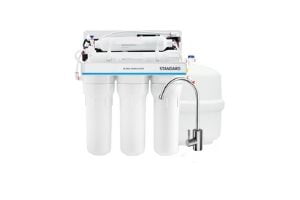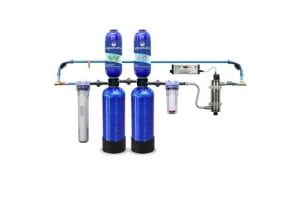
The Benefits of Repiping
Just like any other home appliance, a home’s plumbing system has to withstand a lot of use. They are used every day, multiple times throughout the day, and on-demand. While pipes normally work without our thinking about them, there are times when they can spring leaks, bust, or break altogether.
Though pipes are durable and made to withstand regular use, with time they can also tend to wear down, become thin, crack, get holes in them, and even burst. Nearly every homeowner has experienced the frustration of a pipe that suddenly springs a leak. Whether it’s a slow leak that wets down your cement slab, a trickle that makes the wood support beams always wet and moist, or a continual leak that floods the basement, nearly everyone has experienced a leak. When this occurs, you’ll potentially face significant repair costs due to the impact a water leak can have on a home.
In this article, you’ll learn what a home repipe is, why it’s beneficial when you might need it, and how to care for the plumbing system you have.
What Is a Home Repipe?
 A home repipe occurs when the pipes in your home are too old to properly function. When pipes still have plenty of life left, then a simple patch or replacement is all that is needed to fix a leak. However, when you are dealing with numerous leaks and old pipes, then it becomes necessary to change the pipes in your house altogether.
A home repipe occurs when the pipes in your home are too old to properly function. When pipes still have plenty of life left, then a simple patch or replacement is all that is needed to fix a leak. However, when you are dealing with numerous leaks and old pipes, then it becomes necessary to change the pipes in your house altogether. During a repipe, plumbers will cut away sections of drywall to access the piping in your home. They will then totally change out your old pipes with new ones. After the pipes are installed, the water is tested to ensure there are no more leaks or plumbing problems. Once the drywall is back in place, you won’t even know a repipe took place.
Reasons for Repiping
There are several reasons why homeowners choose to have a whole-home repipe put in. Here are a few.
- Old Pipes: The older your pipes the more likely they are to crack, leak, and wear through. If you own a home that is fifty years old and there has never been a repipe done, it could be beneficial to think about having one done.
- Galvanized Pipes: These pipes are more prone to rust and corrosion than other options available today such as copper.
- Multiple Leaks: If you have leaks from multiple spots in various pipes around your plumbing system, it’s a clear sign that your piping needs to be replaced. While it’s possible to continue patching and replacing pieces of pipe, when you start to find multiple leaks, it points to the overall age of your pipes and a need for replacement.
Remember, the older the pipes, the more prone they are to cracks, leaks, bursting, and pinholes due to wear, use, and corrosion.
Tips for Preventing Pipe Damage

In order to have a chance at preventing the need to completely repipe your home, it’s best to ensure proper maintenance of your plumbing. There are several things you can do to keep your pipes flowing as long as possible. First, watch what you flush and pour down the sink.
Never place things like oil, grease, or fat down the kitchen sink. When flushing the toilet, only use toilet paper and avoid “flushable” products, as they can create clogs. During the winter, be sure to wrap your pipes if you live in a zone that freezes. Wrapping pipes will prevent them from cracking, freezing, and bursting.
Finally, ensure you have the right fittings. Never place galvanized metal fittings onto a copper pipe, as the copper will corrode and begin to leak. Inspect your piping regularly to spot signs of wear and tear quickly. Do this and you’re sure to keep them in good shape.
Reliable, Expert Plumbers

Falcon Plumbing has proudly served Miami, FL, residents for all their plumbing needs for over twenty-five years. They offer a full range of services and can help with all your piping needs. Each customer can be guaranteed to receive personal attention, upfront flat-rate pricing, and 24/7 emergency service with no extra fees.
Distribution Links +
- wrcbtv.com
- lubbocks969thebull.com
- erienewsnow.com
- fox21delmarva.com
- wicz.com
- wboc.com
- tulsacw.com
- weny.com
- 1007thescore.com
- doublet973.com
- 937theeagle.com
- fox34.com
- lubbockcw.com
- magic1065.com
- mylubbocktv.com
- oldies977lubbock.com
- 1077yesfm.com
- rfdtv.com
- ktvn.com
- wfmj.com
- htv10.tv
- snntv.com
- central.newschannelnebraska.com
- metro.newschannelnebraska.com
- southeast.newschannelnebraska.com
- midplains.newschannelnebraska.com
- northeast.newschannelnebraska.com
- plattevalley.newschannelnebraska.com
- panhandle.newschannelnebraska.com
- rivercountry.newschannelnebraska.com
- wrde.com
- telemundonuevomexico.com
- wfxg.com





 Clean water is a mainstay in modern society. It is very easy to take for granted your access to potable water. When a backflow condition occurs, foreign matter, chemical contaminants, and biological contaminants can infect your water supply and leave you vulnerable.
Clean water is a mainstay in modern society. It is very easy to take for granted your access to potable water. When a backflow condition occurs, foreign matter, chemical contaminants, and biological contaminants can infect your water supply and leave you vulnerable.
 If you find that backflow is happening in your system, it is important to know what to do. First, find your
If you find that backflow is happening in your system, it is important to know what to do. First, find your 



 One method to filter your household’s tap water is to install an
One method to filter your household’s tap water is to install an 
 If you want to be sure your household drinking water is safe for consumption, consider a whole home water filtration system. These systems filter all water that enters your home, whether it is for drinking or not.
If you want to be sure your household drinking water is safe for consumption, consider a whole home water filtration system. These systems filter all water that enters your home, whether it is for drinking or not.



 Saturated soil is nothing to mess with. There are numerous problems that can occur from saturated
Saturated soil is nothing to mess with. There are numerous problems that can occur from saturated 
 Cured-In Place: Plumbing companies can remotely line a section of piping without having to dig a trench. The pipe must first be cleaned and dried, then the installers will apply the lining to the cracked area.
Cured-In Place: Plumbing companies can remotely line a section of piping without having to dig a trench. The pipe must first be cleaned and dried, then the installers will apply the lining to the cracked area.



 People talk about
People talk about 
 Sometimes the water only smells when the hot water is turned on. When this happens, it’s likely that there’s an issue with the water heater. Water heaters can experience a buildup of bacteria. When the bacteria from the
Sometimes the water only smells when the hot water is turned on. When this happens, it’s likely that there’s an issue with the water heater. Water heaters can experience a buildup of bacteria. When the bacteria from the 




 There are a number of ways to
There are a number of ways to 




 Blockages have a strange way of occurring unexpectedly. If you don’t take any steps fast enough, your drains will stop flowing completely, and can eventually lead to a bigger problem like burst pipes.
Blockages have a strange way of occurring unexpectedly. If you don’t take any steps fast enough, your drains will stop flowing completely, and can eventually lead to a bigger problem like burst pipes.
 Snaking until you eventually clear a clog sounds easy. That is not a surprise. However, cleaning your drain after unclogging involves a lot more work and experience and could possibly leave you a
Snaking until you eventually clear a clog sounds easy. That is not a surprise. However, cleaning your drain after unclogging involves a lot more work and experience and could possibly leave you a 



 As most all have heard elders say “1 inch of prevention is worth a pound of cure”. In other words, if you do preventative maintenance on your plumbing it will prevent you from having to have repairs done later. Check for drips or leaks in and around your pipes, faucets, and showerheads.
As most all have heard elders say “1 inch of prevention is worth a pound of cure”. In other words, if you do preventative maintenance on your plumbing it will prevent you from having to have repairs done later. Check for drips or leaks in and around your pipes, faucets, and showerheads.
 Proper
Proper 




 While most insurance companies don’t offer flood insurance, you can purchase a flood insurance policy through the
While most insurance companies don’t offer flood insurance, you can purchase a flood insurance policy through the 




 Water pressure that is not at an optimal level can cause many problems to arise in water pipes. One of the most disturbing of those problems is a humming noise. Generally, the humming noise is caused by water pressure that is too high.
Water pressure that is not at an optimal level can cause many problems to arise in water pipes. One of the most disturbing of those problems is a humming noise. Generally, the humming noise is caused by water pressure that is too high.
 Loud banging noises can be startling when they happen in the middle of the night. Chances are, if they are connected to your water pipes, the noise will happen while you are standing at the sink. Though this can still be startling, it is another product of water pressure.
Loud banging noises can be startling when they happen in the middle of the night. Chances are, if they are connected to your water pipes, the noise will happen while you are standing at the sink. Though this can still be startling, it is another product of water pressure.

